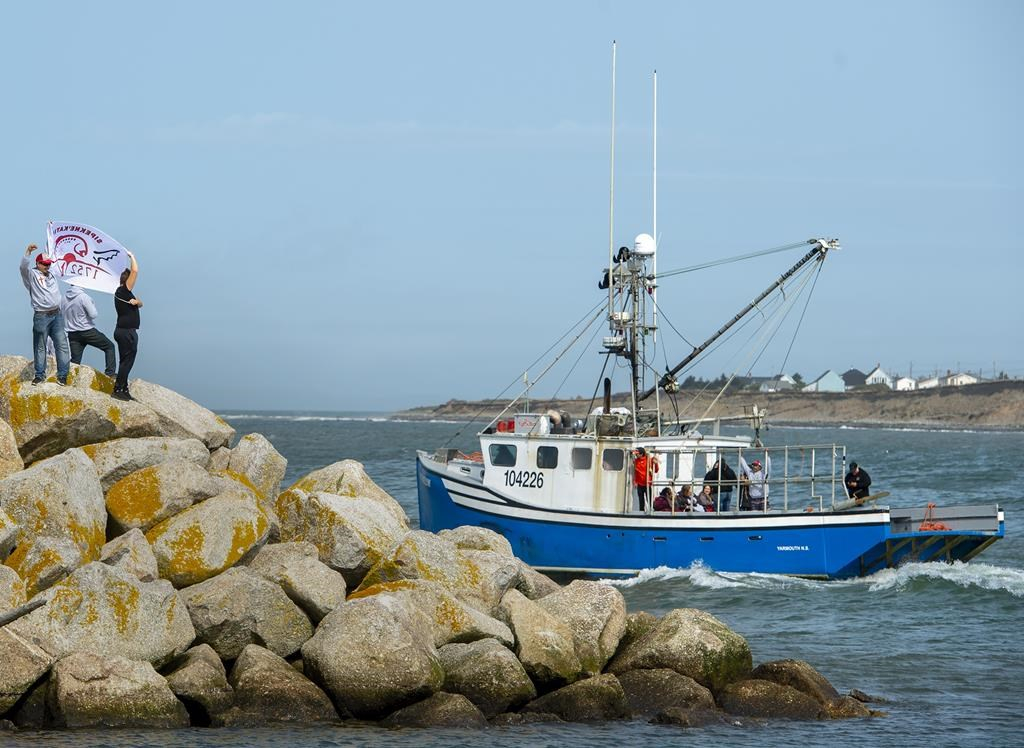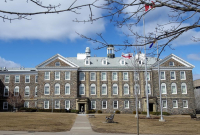Support strong Canadian climate journalism for 2025
Prime Minister Justin Trudeau needs to do more than send tweets to settle an increasingly violent dispute over an Indigenous-led lobster fishery in Nova Scotia, a First Nations chief said Thursday.
"Actions speak louder than words," Chief Mike Sack of the Sipekne'katik First Nation told a news conference Thursday in Digby, N.S., located about 40 kilometres from where a lobster pound was damaged by protesters.
"They're sitting in their offices, safe as can be, saying, 'We need safety out there.' Then send enforcement down," Sack said. "Do your job. Protect Canadians . . . . Don't just tweet about it."
The RCMP have said about 200 people were present at two violent clashes Tuesday outside lobster pounds in New Edinburgh and Middle West Pubnico.
Describing the events as a hate crime, Sack asked Trudeau to send additional law enforcement personnel to the area to ensure the violence is contained.
"This truly is systemic racism," Sack said when asked about the RCMP's actions. "Does Trudeau care about our people? Does he care about reconciliation? They talk about it, but I don't see any actions towards it . . . . The RCMP dropped the ball."
The chief said his council has decided to take legal action against those who are interfering with the band's self-regulated lobster fishery. "We'll go after everyone," he said, adding that his First Nation is considering calling in Indigenous warriors from across the country.
The non-Indigenous protesters say they are opposed to the band's decision to start a commercial lobster fishing business that has operated outside the federally regulated lobster season since mid-September.
Sack argues Indigenous people in Atlantic Canada and Quebec have a treaty right to fish for a moderate livelihood where and when they want, based on a 1999 Supreme Court of Canada decision that cites treaties signed by the Crown in the 1700s.
Many non-Indigenous critics, however, cite a clarification issued four months after the 1999 ruling, stating the Mi'kmaq treaty rights would be subject to federal regulations to ensure conservation of the resource.
Colin Sproul, head of the The Bay of Fundy Inshore Fishermen's Association, said in an interview he condemns the violent acts but added that they are the product of years of growing concern about the state of the stocks.
"We're Canadians. We should expect that dialogue is always the way to solve our problems, not through violence," he said.
He also criticized the Mounties for failing to take action against any of the parties to the dispute. He said he was dumbfounded a few weeks ago when he saw Indigenous fishers trying to board a non-Indigenous boat in St. Marys Bay while an RCMP tactical squad observed.
"I can accept that Indigenous people may have seen acts of violence perpetrated against them that the RCMP walked away from, too," he said.
The RCMP confirmed Thursday they had increased the number of officers in the area following the violent incidents on Tuesday night. "What we’re hoping for is a peaceful resolution to this very important issue," RCMP Sgt. Andrew Joyce said in an interview.
In Ottawa, Minister of Indigenous Services Marc Miller said he found the images of Tuesday night's violence alarming.
"We're talking about a fundamental right to earn a moderate livelihood, that is a right the Mi'kmaq are entitled to exercise," Miller said. He noted that "moderate livelihood" has never been defined in a way that's acceptable to all sides and said non-Indigenous fishers need be involved in the discussion.
"The risk, if we don't get this right, is that people will die . . . . Violence begets violence, and that is unacceptable," he said.
Following a cabinet meeting Thursday, Nova Scotia Premier Stephen McNeil said he was "extremely disappointed" by the federal response to date around the Indigenous lobster fishery. McNeil said Ottawa needs to find a workable solution by sitting down with all sides in the dispute as soon as possible.
"This is only getting more entrenched . . . they need to be in the same room so everyone knows what each other is saying," he said.
McNeil also said the province would provide police with the "resources necessary," including manpower to ensure public safety in the area. "If more people are required, we obviously would have to pick up that bill," he said.
Provincial Justice Minister Mark Furey said he was satisfied with the RCMP response, adding that he thought it's been a "measured approach" under difficult circumstances.
Sack said during the news conference the Mi'kmaq fishery will continue despite the damage done to the holding facilities, the burning of one fisherman's boat and damage to vehicles in recent weeks.
He said the band is now in the process of purchasing the damaged plant in New Edinburgh, which he said would include a buyer's licence if the sale is completed. "It's just a matter of doing the paperwork," he said.
— With files from Danielle Edwards, Keith Doucette and Michael MacDonald in Halifax.
This report by The Canadian Press was first published Oct. 15, 2020.





Comments